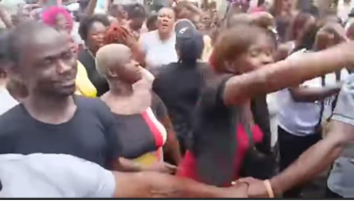The streets of Monrovia, Liberia, became a stage for simmering discontent on September 17, 2025, as dozens of displaced street vendors, primarily women, staged a fervent protest against their forced removal from their vending locations. Their chants of “We want to sell; hopojo na get money!” and “We want freedom!” resonated through the city center, a poignant expression of their struggle for economic survival. The protest was a direct response to a joint operation by the Monrovia City Corporation (MCC) and the Liberia National Police (LNP) that had cleared vendors from key commercial areas, leaving them without their primary source of income. The women’s desperate pleas highlighted the precariousness of their existence, with some expressing fears of being forced into prostitution as a means of survival if denied their right to trade.
The city authorities justified the crackdown as a necessary step towards urban renewal, citing the need to improve sanitation and alleviate traffic congestion. However, for the vendors, this explanation rang hollow, as the removal from their selling spots deprived them of their ability to provide for their families, pay rent, and educate their children. Their protest became a direct appeal to President Joseph Nyuma Boakai, questioning the unfulfilled promises of job creation made during his 2023 election campaign. Their rallying cry, “President Joseph Nyuma Boakai, where are the jobs you promised?”, underscored the disconnect between political rhetoric and the lived realities of marginalized communities.
Representative Emmanuel Dahn of the ruling Unity Party, representing the affected district, responded to the protest, offering an interim solution that allowed the vendors to temporarily return to their designated areas. His assurance of a negotiated settlement, involving strategic placement and demarcation of vending zones, was met with relief and gratitude from the protesting women. Rep. Dahn emphasized that this temporary measure was a stepping stone towards a more comprehensive and sustainable plan that would balance urban order with economic opportunities for informal traders.
The proposed long-term solution included the establishment of clean and organized selling zones, ensuring pedestrian access, and improved waste management practices. However, the emotional scars and economic hardship endured by the vendors during the period of displacement remained palpable. A sense of betrayal by the national leadership persisted, with one woman poignantly expressing her disillusionment: “Where is President Joseph Nyuma Boakai? Is this the job he promised us, by taking us out of business? I want to cater to myself and my children.” This statement captured the core issue: the clash between urban planning initiatives and the immediate survival needs of those dependent on the informal economy.
The protest highlighted a broader issue of social and economic vulnerability within Liberia. The enforcement of the no-street-selling policy, while intended to bring order to the city, exposed the lack of alternative provisions for informal vendors, pushing them further into economic precarity. The policy’s implementation, without adequate consideration for the livelihoods of those affected, sparked criticism for its lack of inclusivity and foresight. The vendors’ demands were simple yet profound: the right to trade peacefully and to live with dignity.
The incident placed immense pressure on the Monrovia City Corporation and the national government to devise a just and sustainable solution for the thousands reliant on the informal sector for survival. The challenge lay in balancing the need for urban development with the protection of the livelihoods of vulnerable populations. Finding this balance requires a comprehensive approach that incorporates not just regulation but also the provision of alternative economic opportunities, training, and support for informal traders. The protest served as a stark reminder of the human cost of urban policies and the urgent need for inclusive development strategies that prioritize the well-being of all citizens.














